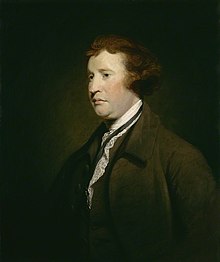Edmund Burke
Edmund Burke (12 Januar [NS] 1729[1] – 9 Julie 1797) wis a Breetish-Erse[2][3] statesman born in Dublin, as well as an author, orator, poleetical theorist, an philosopher wha, efter muivin tae Lunnon, served as a Member o Pairlament (MP) for mony years in the Hoose o Commons wi the Whig Pairty.
Edmund Burke | |
|---|---|
 | |
| Born | 12 January 1729 Dublin, Ireland |
| Dee'd | 9 Julie 1797 (aged 68) Beaconsfield, Buckinghamshire, Great Breetain |
| Alma mater | Trinity College, Dublin |
| Releegion | Kirk o Ireland |
| Era | Aichteenth century philosphy |
| Region | Wastern philosophy |
| Schuil | Conservative liberalism, Conservatism |
Main interests | Social an poleetical philosophy |
Notable ideas | The Sublime as something that can provoke terror in the audience |
Influences
| |
Influenced
| |
Edmund Burke | |
|---|---|
| Paymaster o the Forces | |
| In office 1782–1782 | |
| Precedit bi | Richard Rigby |
| Succeedit bi | Isaac Barré |
| In office 1783–1783 | |
| Precedit bi | Isaac Barré |
| Succeedit bi | William Grenville |
| Personal details | |
| Born | 12 Januar 1729 Dublin, Ireland |
| Dee'd | 9 Julie 1797 (aged 68) Beaconsfield, Buckinghamshire, Great Breetain |
References
eedit- ↑ The exact year o his birth is the subject o a great deal o controversy; 1728, 1729, an 1730 hae been proponed. The month an day o his birth an aa are subject tae question, a problem compoondit bi the Julian-Gregorian chyngeower in 1752, during his lifetime. For a fuller treatment o the question, see F. P. Lock, Edmund Burke. Volume I: 1730–1784 (Clarendon Press, 1999), pp. 16–17. Conor Cruise O'Brien (2008; p. 14) quaistens Burke's birthplace as havin been in Dublin, arguin in favour o Shanballymore, Co. Cork (in the hoose o his uncle, James Nagle).
- ↑ Clark, J. C. D. (2001). Edmund Burke: Reflections on the Revolution in France: a Critical Edition. Stanford. p. 25. ISBN 0-8047-3923-4.
Edmund Burke was an Irishman, born in Dublin but in an age before 'Celtic nationalism' had been constructed to make Irishness and Englishness incompatible: he was therefore free also to describe himself, without misrepresentation, as 'a loyalist being loyal to England' to denote his membership of the wider polity. He never attempted to disguise his Irishness (as some ambitious Scots in eighteenth-century England tried to anglicise their accents), did what he could in the Commons to promote the interests of his native country and was bitterly opposed to the Penal Laws against Irish Catholics.
- ↑ Hitchens, Christopher (Apryle 2004). "Reactionary Prophet". The Atlantic. Washington.
Edmund Burke was neither an Englishman nor a Tory. He was an Irishman, probably a Catholic Irishman at that (even if perhaps a secret sympathiser), and for the greater part of his life he upheld the more liberal principles of the Whig faction.